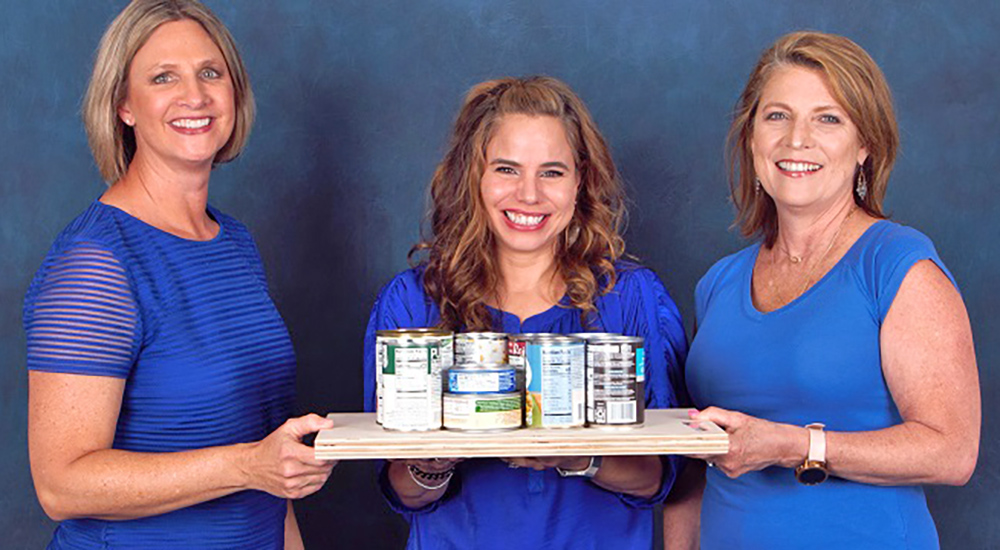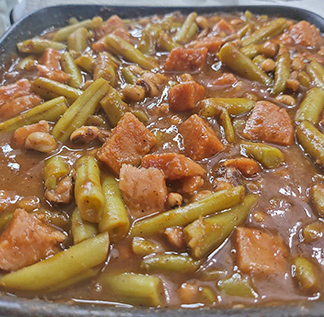Air Force and Marine Corps Veteran Joseph McDonald was hungry, and he described the thoughts that came to him when he was food insecure: devastation, hopelessness, depression. “I just want to give up. Maybe I can go a week without eating and not letting anyone know. I’ll just drink water. It’s more important than food. Am I going to starve? Am I going to die?”
McDonald is a prime example of why South Texas VA has recently started a food insecurity program and hired Food Security Manager and Registered Dietitian Cristina Elizondo.
Elizondo started her position June 4, but she had already laid the foundation, attending community food insecurity workgroups with San Antonio Metro Health, looking at Gus Schumacher Nutrition Incentive Program grants for benchmarks and best practices, and co-chairing the Veterans Community Partnership with Social Worker Amber Miracle.
The idea of bringing a program to South Texas was the result of the Chief of Nutrition and Food Services Maria Worley’s attendance at a national food insecurity conference. “Ms. Worley is an innovator, and this position exists because of her,” Elizondo said. “She saw a huge gap, saw demand, and saw that we were not doing enough for that demand.”
“We identified the need to improve our program for Veterans with a position that will coordinate all efforts, from screening to getting food in the hands of the Veterans,” Worley said.
Took Healthy Teaching Kitchen skills home
Elizondo already started an internal food drive and made food boxes to spread across the units. A food insecure Veteran will go home with groceries. She says this effort will take a collaborative multidisciplinary approach.
Pictured above (left to right), Tamara Sugarek, Cristina Elizondo and Maria Worley with canned goods collected during internal food drive.
McDonald was one of the Veterans identified as food insecure.
“I went through the interview process and then I took part in the cooking program,” he said.
The program is the Healthy Teaching Kitchen (HTK) run by registered dietitian Tamara Sugarek.
“The practical application component of HTK provides education with hands-on cooking techniques that creates a supportive environment for Veterans to learn with their peers. They are able to take the skills they learn back home and cook independently for their families,” Sugarek said.
Sugarek says the biggest feedback she gets from Veterans is their surprise that they can make simple, healthy dishes taste good. This was also an eye-opener for McDonald, who grew up in Louisiana and is used to flavorful dishes.
“In these classes, there is so much they have taught me. I went in thinking I could cook, but I found out there were a lot of different techniques I did not know,” McDonald said.
Those techniques would play a big role in McDonald’s future well-being.
Meal looked “insanely good,” so he sent pictures
One particular month, McDonald wasn’t doing well, but he did have some canned goods, some seasoning and a microwave, so he got to work, remembering what he learned at the HTK.
He worked through the cans, remembering his HTK lessons on balancing nutrition and what foods have the requisite proteins and vitamins he would need. He made dish after dish, impressing himself with his creativity.
He sent images of his creations to his instructor, Tamara Sugarek. “While I was doing it, I started thinking maybe I should take some pictures of this food because it looks insanely good. I sent them to my mom and Tamara. I would not be exaggerating when I say I thank God for the HTK because that particular month, it saved my life.”
If you feel you are food insecure, you are not alone. In 2021, more than 10% of Americans (including Veterans) were food insecure. The VA Nutrition and Food Services website has a screening tool and resources available to Veterans.
Topics in this story
More Stories
The Medical Foster Home program offers Veterans an alternative to nursing homes.
Watch the Under Secretary for Health and a panel of experts discuss VA Health Connect tele-emergency care.
The 2024 National Veteran Suicide Prevention Annual Report provides the foundation for VA’s suicide prevention programs and initiatives.








Please have Cristina Elizondo contact the Satellite Rotary Club of Military Family Support. We would like to schedule her as a speaker.